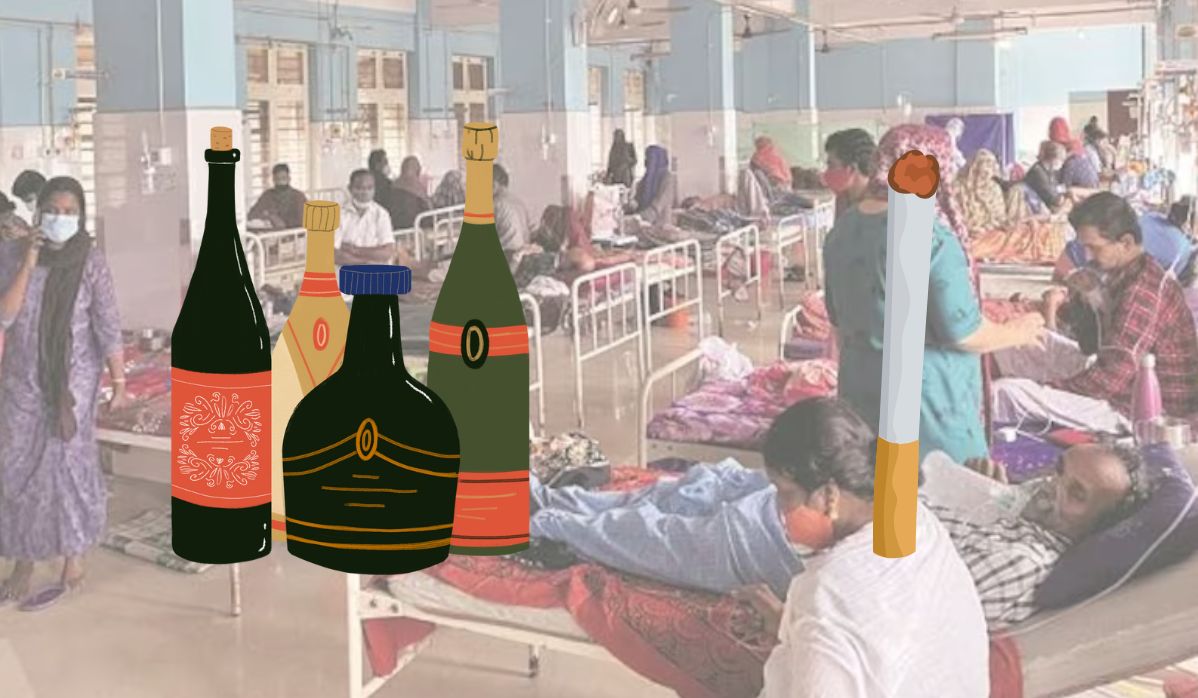Tarun Karthick
Campbell Bay, 06 November 2024
Andaman and Nicobar Islands show some of the highest rates of tobacco and alcohol consumption in India, according to the National Family Health Survey (NFHS) 2019-2021. With 59% of men and 19% of women aged 15 and above using tobacco, and 42.1% of men and 2.2% of women consuming alcohol, these figures exceed national averages by considerable margins. The implications of these high rates extend beyond individual health, impacting families, the healthcare system, and the broader community.
Health Implications of High Tobacco and Alcohol Consumption:
Excessive tobacco and alcohol use are closely linked with a range of serious health conditions. High tobacco usage significantly increases the risk of:
- Respiratory illnesses: Smoking or tobacco chewing can lead to chronic obstructive pulmonary disease (COPD) and other respiratory issues. COPD affects breathing capacity and can reduce life expectancy.
- Cardiovascular diseases: Tobacco raises blood pressure, reduces oxygen flow, and contributes to the formation of plaque in arteries, heightening the risk of heart attacks and strokes.
- Cancer: Tobacco use is a major contributor to cancers of the lung, mouth, throat, and esophagus. The risk of developing these cancers increases substantially among those who consume tobacco products regularly.
- Dental and oral health issues: Tobacco can cause oral cancers and contribute to severe dental problems, including gum disease and tooth loss, which are increasingly prevalent in high-tobacco-use areas like Andaman and Nicobar.
Likewise, alcohol consumption carries significant health risks:
– Liver disease: Chronic alcohol use is the primary cause of liver diseases such as cirrhosis and liver cancer. High alcohol consumption can lead to irreversible liver damage and affect digestion, metabolism, and immunity.
– Mental health issues: Alcohol is associated with mental health problems such as depression, anxiety, and impaired judgment, which can lead to further social and behavioural issues.
– Increased risk of accidents and injuries: Alcohol impairs motor skills and judgment, leading to a higher incidence of accidents, including road injuries, falls, and violence.
– Gastrointestinal issues: Alcohol contributes to gastric problems, including ulcers and inflammation, which can result in long-term digestive disorders.
Broader Public Health and Economic Implications:
The high rates of alcohol and tobacco use in the Andaman and Nicobar Islands carry significant economic and public health burdens. Individuals suffering from tobacco- and alcohol-related illnesses require long-term medical interventions, increasing demand on healthcare facilities that are already limited due to the geographical isolation of the islands. For many families, the financial costs of treating chronic illnesses add economic strain, often leading to a cycle of poverty and health complications.
High substance use also has intergenerational impacts, as children growing up in environments where tobacco and alcohol use are normalised are more likely to adopt these habits themselves. This perpetuates a cycle of poor health and reduces opportunities for educational attainment and economic productivity.
Potential Solutions: A Public Health Priority –
Given the high rates of tobacco and alcohol use in Andaman and Nicobar, a multi-faceted public health response is crucial. Effective measures could include:
– Community-based awareness campaigns: Informing people of the health risks associated with tobacco and alcohol, especially targeting high-risk groups, can play a vital role in reducing consumption.
– Substance cessation programs: Providing resources, counselling, and support groups for quitting smoking/oral tobacco use and reducing alcohol intake can be beneficial. These programs can work alongside healthcare providers in both urban and rural areas.
– Strengthening healthcare facilities: Enhancing diagnostic and treatment facilities for tobacco- and alcohol-related diseases will help manage the long-term health impacts on affected individuals.
– School and youth initiatives: Educating young people about the dangers of tobacco and alcohol through schools and community centres can help to prevent the onset of these habits early on.
The NFHS data signals an urgent need for intervention. By addressing these high rates of substance use, the Andaman and Nicobar Islands can take a step toward improved public health, a reduction in preventable diseases, and a healthier future for all residents.

